Trekking in Uttarakhand is not just about mountain climbing, river crossing or getting fresh Himalayan air. It’s the ability to absorb the culture, traditions and the hospitality of the people who inhabit and dwell around these mountains.
Every trekker who set foot in these trails is greeted by villages that have been around for generations, by people who live their lives around the forests, rivers, and fields of this land. These villagers are the ones who make your treks happen either by leading you through the trails, providing the accommodation, or cooking a hot meal after a trekking day.
But stop and think for a second about how much we really give back to these communities?
Tourism, and trekking tourism in particular, can be beneficial to the local communities. But it’s our responsibility to make sure that the money we spend reaches the locals directly rather than being pocketed by large companies that have no connections in these villages. The best part? Helping out local communities is not hard. In fact, it makes your trekking adventure even more rewarding.
So, how do we, as responsible trekkers, make a good impression? Let’s learn it.
Table of Contents
Why Is Supporting Local Communities Important?
When you trek in Uttarakhand, you’re not just exploring mountains and valleys. You’re trekking in someone’s backyard, where traditions are kept alive and families make a living through tourism.
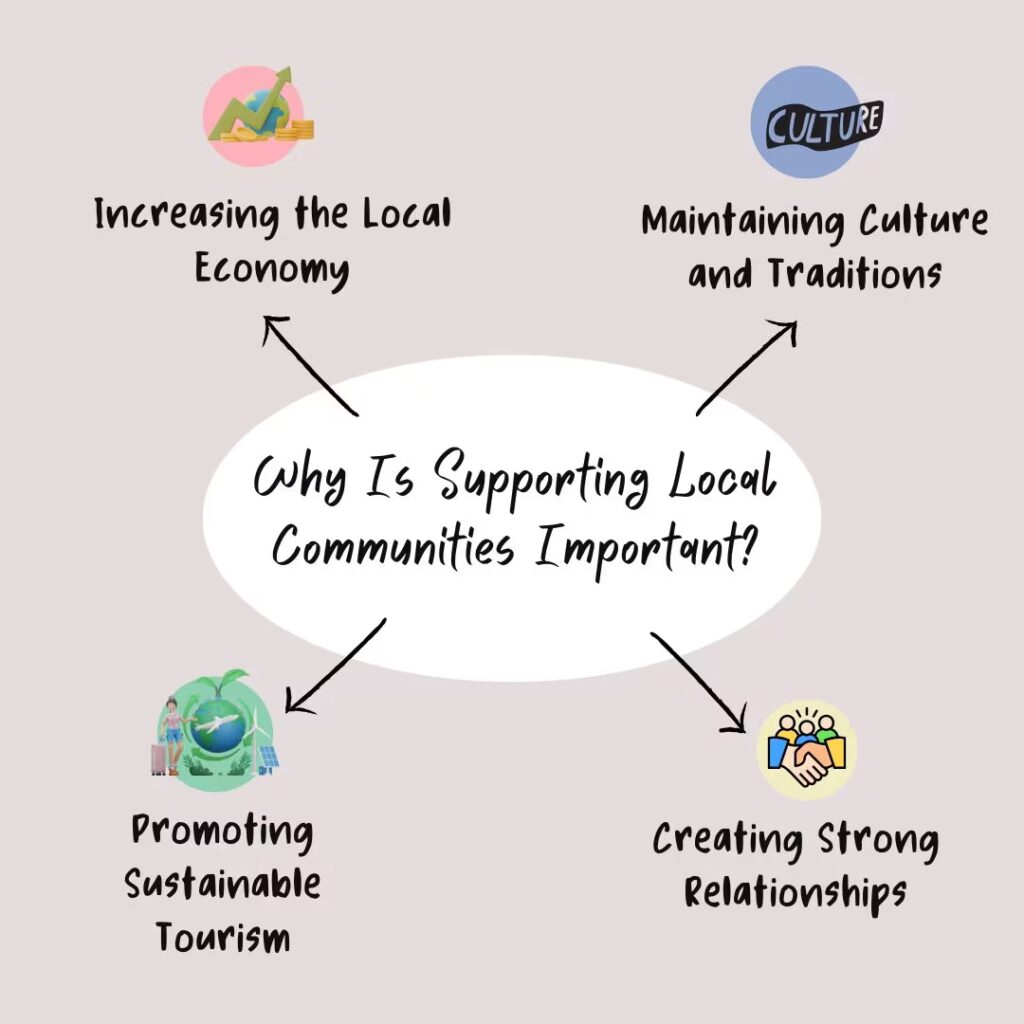
Increasing the Local Economy
The majority of the inhabitants of these villages rely on tourism to make a living. When we choose to travel with local guides, eat at homestays, and drink locally made beverages, we help to keep the money localised and not in the hands of the large corporate company. That one rupee could be enough to send children to school and fund a local health center.
Maintaining Culture and Traditions
Numerous villages in Uttarakhand are maintained with rich tradition, folk music, and handicrafts that are gradually diminishing owing to modernisation. Support for local artisans, watching cultural events, and attending festivals all contribute to maintaining traditions. Every purchase and welcoming conversation can instill in the community to maintain practices handed down from generation to generation.
Promoting Sustainable Tourism
Mass tourism tends to cause pollution, deforestation and litter in fragile mountain ecosystems. By staying in homestays that are eco-friendly, hiring local guides, and adhering to regulations set down in villages, we can minimise our impact. Ecotourism is a win-win situation, saving nature and cultural heritage for future generations of travelers and earning money for locals.
Creating Strong Relationships
Trekking is not only about the scenery, it’s experiences, tales, conversations, and the people you meet along the way. When you trek with locals, your experience is more genuine and memorable. The tales you hear from an experienced guide or the hospitality of a homestay host bring life to the experience that no brochure can provide.
How You Can Support Local Communities While Trekking
Supporting locals does not have to be a massive undertaking. It’s about making wise choices. Below are the most effective ways to make a real impact on your trek in Uttarakhand:
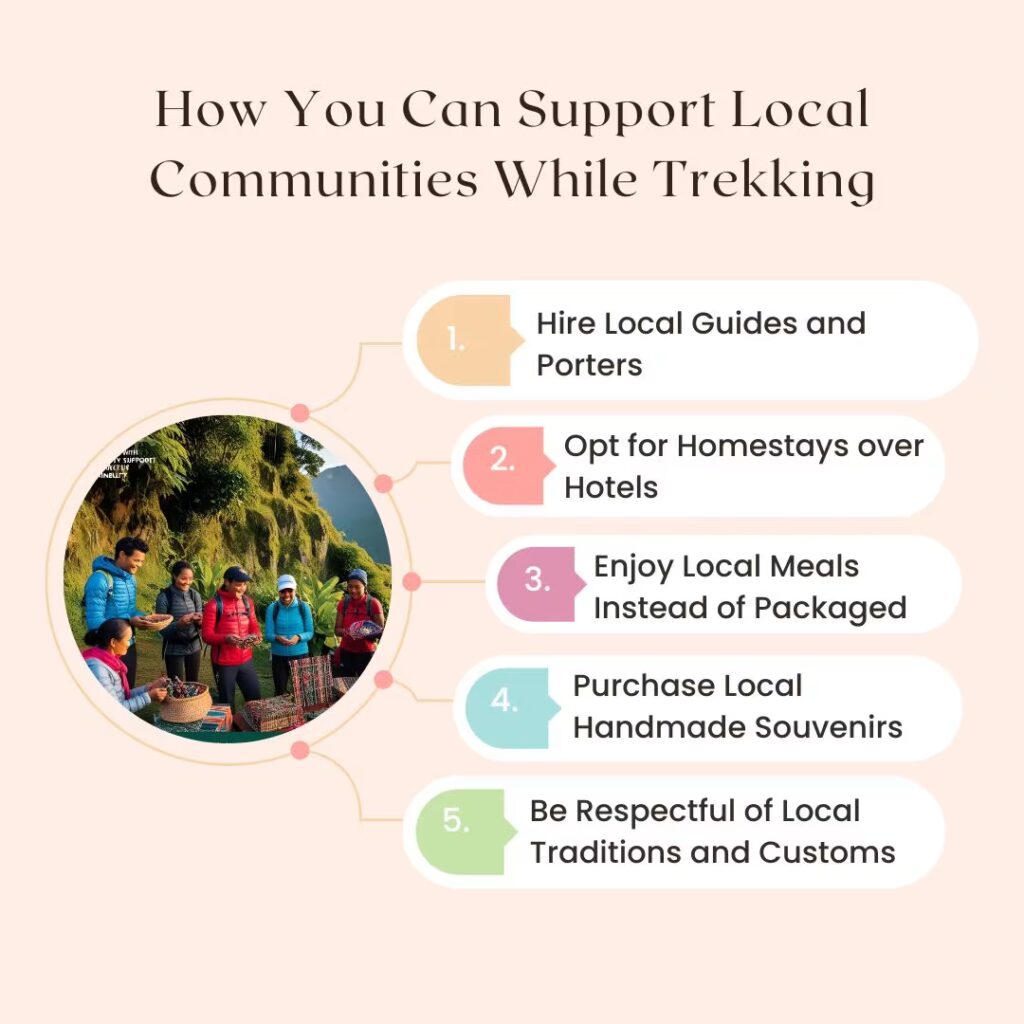
1. Hire Local Guides and Porters
One of the easiest and best ways to support locals is to hire guides and porters locally rather than going through big agencies that use their own guides from outside.
Why is this important?
- Local guides have the best knowledge of the terrain. They grew up here! They are familiar with the safest routes, the best-kept secrets, and the history of the land. Their raw experience can make your trek more informative through history and the great stories.
- Your money stays in local families. A large portion of a local guide’s income comes from trekkers like you. By hiring them directly, you are guaranteeing that they are paid well, which is good for their families and the community at large.
- You get a more authentic experience. A local guide will share stories, narrate folk tales, and even impart some words of the local language. The personal experience makes the experience more stimulating and real.
Pro Tip: Prior to booking a trek, ask if the organisation employs local guides and porters. Some companies may underpay their staff while charging trekkers high fees. A little research and a few questions can help you choose an option that truly benefits the community.
2. Opt for Homestays over Hotels
Doing one of the best things for the mountain villages is staying in a homestay rather than a hotel or campsite. Homestays are an experience in themselves, and you can become friends with the locals as yourself and not as a tourist.
Why do you stay at a homestay?
- You are helping directly into a family’s pocket- Unlike hotels, where money finds its way into the hands of owners who may never even visit the area. Homestays mean that the money you spend ends up in a local family’s hands. It can help enhance their way of life and pay for community projects.
- You enjoy real village life- In homestay, you wake up to the sounds of nature, eat fresh homemade, local food, and spend time with locals who have very interesting experiences and stories about their culture and life.
- You get home-cooked meals- Instead of relying on mass-produced food, you’ll have the opportunity to savor traditional Uttarakhandi dishes like Mandua Roti, Aloo Ke Gutke, and Bhatt Ki Churkani. These meals are not only delicious but also offer a true taste of the local culture.
Villages known for great homestays include:
- Sankri: A welcoming gateway to the Kedarkantha trek, known for its warm hospitality.
- Raithal: Starting point for trek to Dayara Bugyal, where local family-run homestays in the area provide a local village life experience in a family mode.
- Sari: Starting point for trek to Deoriatal-Chandrashila, with a peaceful atmosphere and genuine local experience.
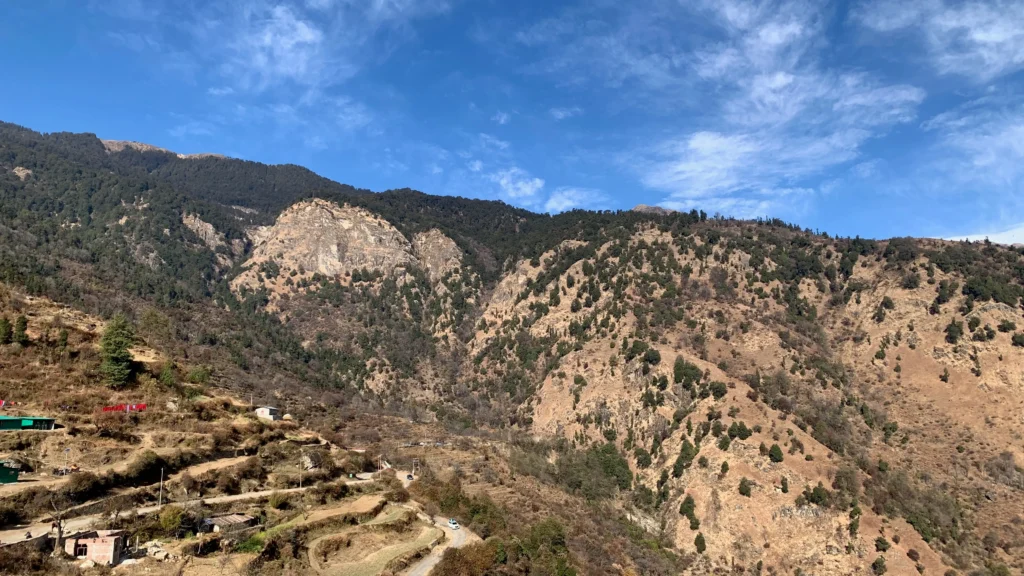
Pro Tip: Book a homestay beforehand and inquire if they have amenities and are participating in any sustainable on-going projects, for example solar or rainwater harvesting. Then your visit is both comfortable and supportive of local sustainability efforts.
3. Enjoy Local Meals Instead of Packaged
Most trekkers rely on instant noodles and energy bars due to the inconvenience, but consuming local meals has several benefits that can enhance your experience.
Why consume local food?
- It’s healthier and fresher- Food prepared with locally grown ingredients is not only healthier but also prepared by retaining the natural taste by the traditional method of preservation.
- It employs the farmers and the cooks in town villages- When you dine locally, your money goes directly to the pockets of the farmers that produce them and the cooks that cook, keeping the entire food system enclosed within the community.
- It reduces plastic- Packaged food generates unnecessary trash on the trails. Consuming local food helps you reduce the trash and plastic that can damage the environment.
Must-try Local Food of Uttarakhand are:
- Aloo ke Gutke- Spicy potato cooked in mustard and coriander, a humble yet tasty dish that is a great example of indigenous food.
- Jhangora Kheer- Sweet millet dessert providing an insight into the local food culture.
- Buransh Juice- A medical and refreshing drink prepared from the flowers of rhododendron.
4. Purchase Local Handmade Souvenirs
If you’d like to take a bit of Uttarakhand back home, skip the factory-made plastic souvenir and instead buy items made by local artisans. Handmade goods are distinctive, culturally significant, and promote local livelihoods.
Top Local Souvenirs to Purchase
- Handloomed Woolen Shawls & Caps- These are made by village women traditionally such as in Munsiyari, these are not just useful but also show the rich textile heritage of the state.
- Wooden Carvings- These are seen in temples as well as villages, depicting the mythological beauty and natural dimensions of Uttarakhand. As they are handmade in their unique manufacturing, each one of them is an artwork speaking on its own behalf.
- Organic Honey & Herbal Tea- These are crafted by hand from villages such as Almora and Ranikhet using the traditional method, and they exhibit the rich, earthy nature of the land.
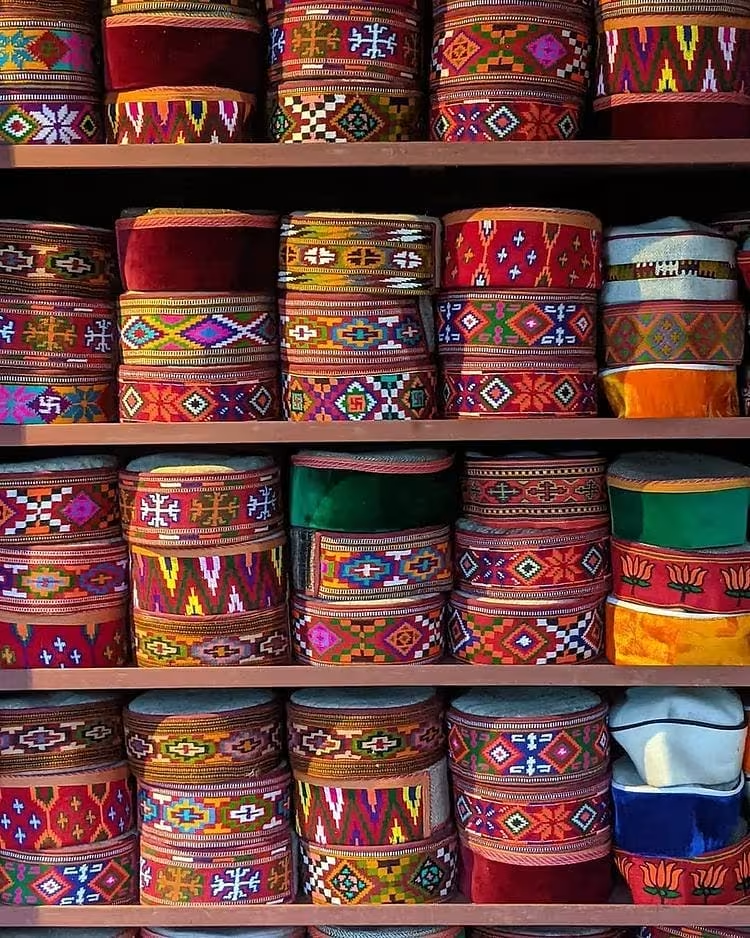
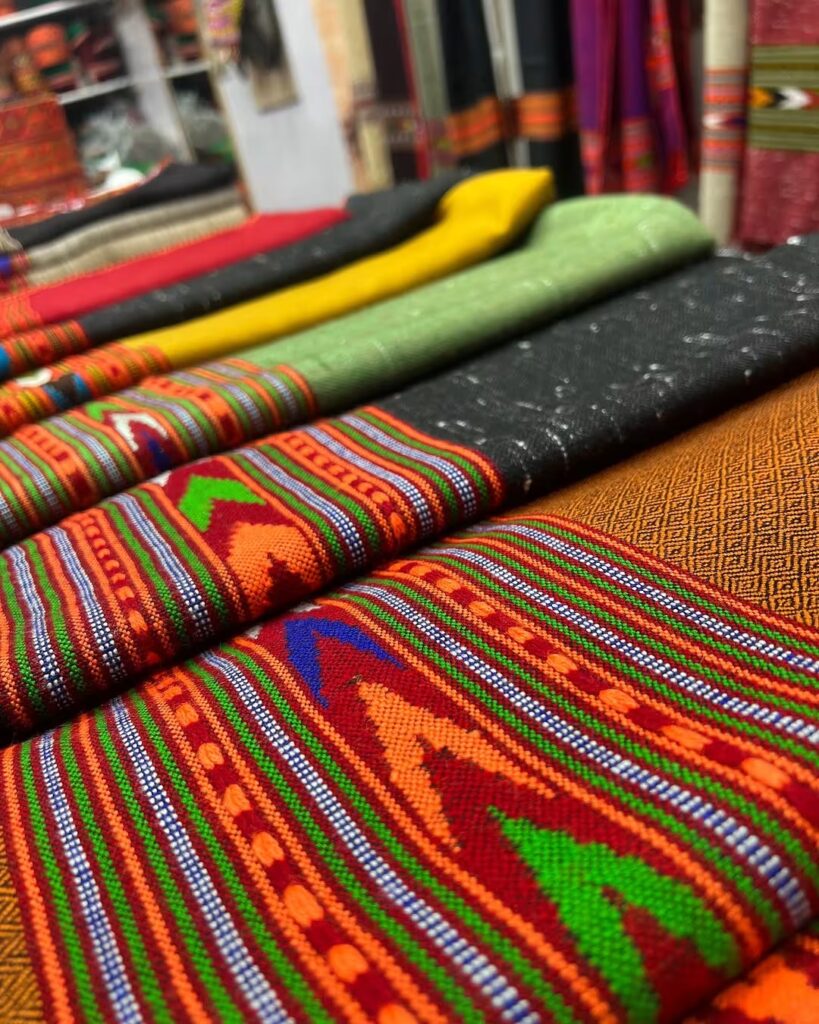
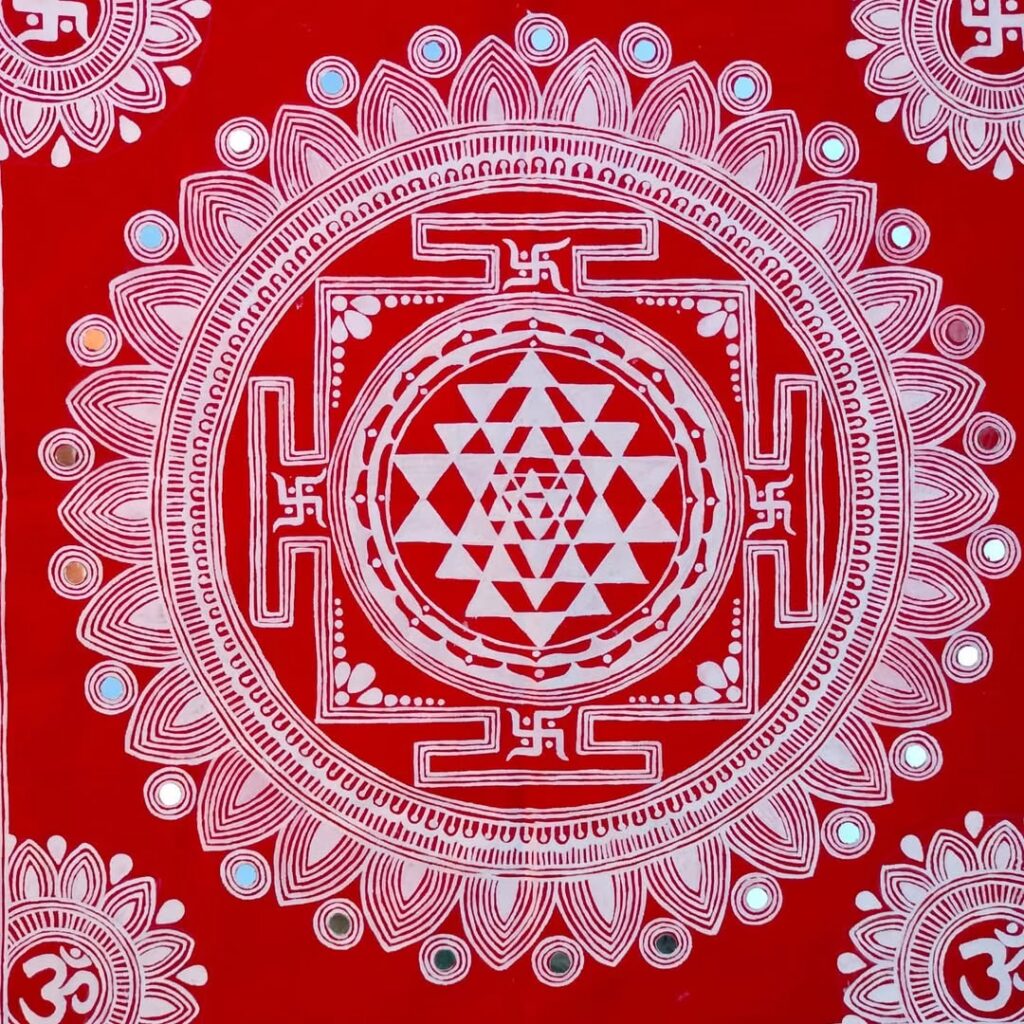
Pro Tip: Always remember to ask the seller about their craft. Knowing what makes something special will make the item more valuable to you, and it is a sign that you value the craft and tradition going into the work.
5. Be Respectful of Local Traditions and Customs
The most treks run through villages with the traditions set long ago. Some cultural sensitivity will go a long way in creating a friendly and respectful atmosphere.
- Smile and greet people- A friendly “Namaste” or “Jai Badri Vishal” (the traditional garland greeting in Garhwal and Kumaon) is always welcome. Even this small gesture can help develop a friendly interaction from the very beginning.
- Ask permission to photograph- Some of the villagers will not like having their picture taken without asking first. Asking is a sign of respect for their privacy and cultural sensibilities.
- Be respectful of local dress code- Shorts and short skirts should normally be avoided in religious sites or traditional villages. Dressing sensibly is an indication that you respect the local culture and allows you to move more comfortably among the locals.
Pro tip: There are several traditional festivals that are celebrated in villages around the year. At a festival, you may be asked to participate in folk dances or community meals. It would be a good time to join in the local culture.
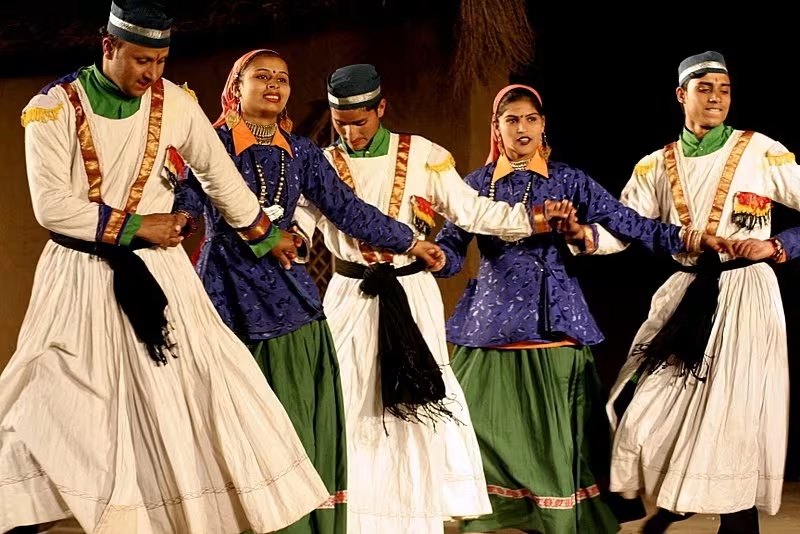
6. Participate in Local Community Projects
Aside from your usual interaction, you can do a great deal of good by joining community projects for volunteer work. Most trekking routes in Uttarakhand have local projects on conservation, education, or community development.
How You Can Participate:
- Participate in a Clean-Up Drive- There are “Clean Trek drives” for some trekking groups where volunteers pick up trash on the trails. This small act keeps the environment clean and promotes a sense of communal responsibility among the trekkers. Check with Waste Warriors, Nature’s Buddy, Healing Himalayas, or HDT Foundation regarding this.
- Support Women’s Self-Help Groups- The majority of the local women’s organisations produce handmade crafts, pickles, or woolens. Purchasing their products not only provides them with a steady income but also enables them to pursue their traditional small business and craft work.
- Teach Basic English or Skills- Some villages open their doors to trekkers to impart their skills to the villagers or village children. Whether it is a brief English class or a photo session, your skill can change lives.
- Be a Part of Environmental Conservation- Some communities actually conduct reforestation or wildlife conservation. Your part, no matter how little, in planting a tree can make a huge difference in seeing that the natural scenery of Uttarakhand remains unperturbed for years to come.
Pro Tip: Ask your homestay host or local guide about ongoing community projects during your stay. There are often opportunities for short-term involvement that can lead to lasting benefits for the community.
Final Thoughts: Travel with Purpose
Trekking in Uttarakhand is not just an adventure but an opportunity to connect, learn, and contribute. With every small but big decision that you make, be it hiring guides from the village, homestay accommodations, eating local food, buying local handicrafts and souvenirs and appreciating village life, you transform your trek into one that contributes to your own life as much as to that of the villagers.
Each choice, no matter how minor, makes a significant impact. Your money used, the stories you hear, and relationships you build can contribute to running local schools, empowering women, and supporting the continuation of ancient traditions. In return, you acquire an understanding of a lifestyle that has been fostered by the earth and its past.
So the next time you go for a trek, ask yourself: How can I make a difference? Even little things can be a world of difference.

Leave a Comment